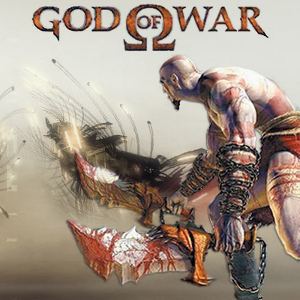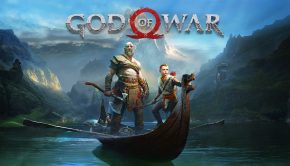God of War Soundtrack
 |
Album Title: God of War Soundtrack |
| Record Label: Sony Computer Entertainment |
|
| Catalog No.: N/A |
|
| Release Date: March 1, 2005 |
|
| Purchase: Not Available |
Overview
The bestselling and award winning God of War series first hit the stores in March 2005. Listed as one of the PlayStation 2’s top 25 games by IGN in 2007, God of War features excellent gameplay, graphics, and, of course, music. The God of War Soundtrack features music from Hollywood musicians Gerard Marino, Mike Reagan, Winifred Phillips, Ron Fish, and Cris Velasco. Though Reagan and Marino contribute the most themes to the album, their fellow composers each have a couple of impacting tracks and earn their place on the soundtrack. With the game set in Ancient Greece, their themes not only try to be epic, but also try to highlight that sense of place that the game needs. The soundtrack was released exclusively as a digital album, complete with narration and voiceovers from the game’s cast in places, though is no longer publicly distributed.
Body
Gerard Marino’s tracks use some very hard-hitting instrumentation to create a very aggressive atmosphere. “Athens Rooftops Fighting,” “The Great Sword Bridge of Athena,” and “The Vengeful Spartan” each feature heavy drum use and prominent strings, and are each graced with some gripping crescendos, diminuendos, and other features to heighten the mood. “The Vengeful Spartan” has gone on to become one of the staples of the franchise, with its unforgettable Arabian-influenced rhythms and hooks. Two of Marino’s tracks which really stick out are “Kratos and the Sea” and “The Story of Chronos.” “Kratos and the Sea” features especially creative development and impressive use of instrumentation; the strings especially are used to their full abilities, both being forced to play shrilling (often frightening) sections, as well as much smoother and gorgeous melody towards the end. Despite being a short track, “The Story of Chronos” also has a distinctive and mystical texture with its use of vocals, guitar, and ethnic instruments.
Though each theme on the album is orchestral, each composer utilises their main strength to create a good selection of diverse themes. Cris Velasco’s contributions for example, are of the more melodic variety and of course this is where his strengths lie too. The Borderlands and Darksiders composer seems to hit the nail on the head when it comes to attaining balance between the melody and accompaniment in each track, ensuring that he stills creates that recognisable dangerous aura upheld throughout the rest of the album. His three themes, “Zeus’ Wrath Divine,” “Hades God of the Underworld,” and “Minotaur Boss Battle” are each well melodically developed. The latter is perhaps the most striking and memorable, a perfect accompaniment to the memorable and terrifying boss battle. As with the soundtrack as a whole, the production values of these tracks also stands out; the orchestral samples are impressively implemented and mixed for their time, and still sound good almost ten years later.
Mike Reagan and Ron Fish’s strengths each lie in creating powerful sounds through focusing on background development and ethnic instrumentation rather than melodic exploration. Some of Mike Reagan’s tracks which are especially worth pointing are “Ares Destroys Athens”, a brief brass-dominated track that manages to create such a impact in conjunction with the breathtaking in-game scene, and “Mind the Cyclops”, with its threatening choral work and other chilling instrumentation. Ron Fish’s tracks are just as good, with “Pandoran Cyclopes Attack” and “The Architect’s Mysteries” being the two most impacting ones. “Pandoran Cyclopes Attack” is one of the album’s better action themes with its fast paced drum line and constant orchestral hits. After that track, “The Architect’s Mysteries” does seem a little more normal in comparison and is certainly more in the strain of music presented by Mike Reagan.
Winifred Phillips’ strengths lie in her ability to generate a great deal of power through a rather ambient — almost minimalistic — approach. “Pandora’s Box” is the most melodic of Phillips’ themes, using some high pitched vocals and airy sound effects to produce one of the soundtracks most relaxing moods. Similar instrumentation is also used in “Enthroned on Mount Olympus,” but this theme also sees accompaniment from sustained strings, adding a little more substance than what “Pandora’s Box” touched upon. “Exploring the Ruins” and “The Underwater World of Poseidon” are actually her stronger themes though, perhaps due to the mysterious vibe which they emanate. “Exploring the Ruins” truly is exploration (or experimentation if you will) with Phillips seeming to use nearly every ambient instrument in her repertoire: from gongs to chimes, and from pan pipes to a gothic choir, this piece has the soundtracks most intriguing blend of music. What could be better in such a perplexing in-game environment? “The Underwater World of Poseidon” isn’t as inspiring as “Exploring the Ruins,” but presents ominous sounds from all angles through its stunning development.
One of the album’s weaker points is that it contains a lot of scenes from the game during which the narrator and characters talk. These tracks are accompanied with some quite atmospheric music and are obviously included to provide some continuity between the soundtrack and the game. However, they seem a little misplaced on a stand-alone basis and are also rather cliched. Mike Reagan and Chris Velasco’s “Duel with Ares” is probably the only worthwhile addition for stand-alone listeners, since it is actually allowed some time to developed without any voices. The underlying music captures the aggression of war, with this atmosphere heightened by raging militaristic drums, rampant brass, and ravenous strings. It is in many regards undermined by its stereotypical voice actors, but stands tall over the other tracks, simply due to the fact that it’s allowed to breathe.
Summary
Overall, the entirety of this soundtrack is made up from orchestral pieces, and in truth, the composers generally use similar techniques to create the epic, menacing sound which the game demands. Amazingly, despite this being apparent throughout the soundtrack, the composers seem to have fortunately avoided producing a neverending dullness of action themes, as may have otherwise been expected. Rather, their collective musical knowhow makes way for a large number of well-developed orchestral themes, with a noticeable creative use of ancient and ethnic instrumentation. If anything, it’s just that small set of themes with voiceovers which affects the overall quality.
Do you agree with the review and score? Let us know in the comments below!
4
Posted on June 2, 2010 by Dave Valentine. Last modified on September 2, 2014.













